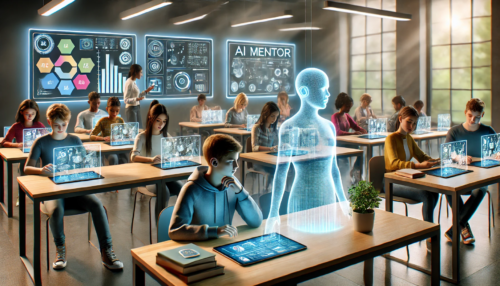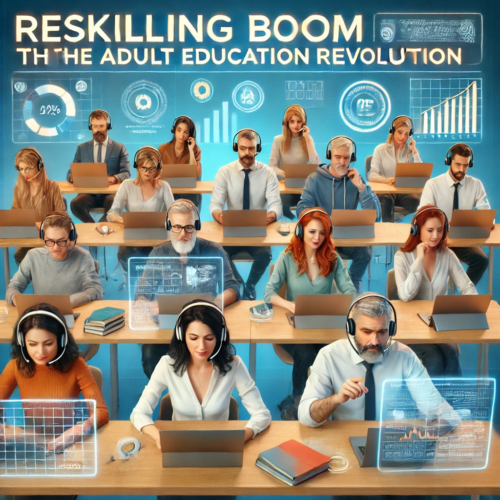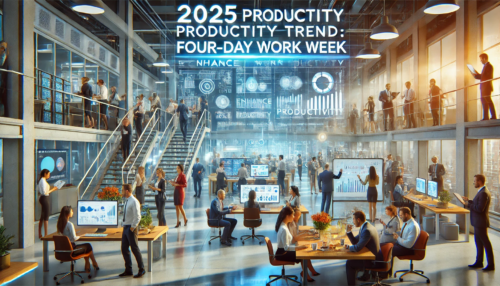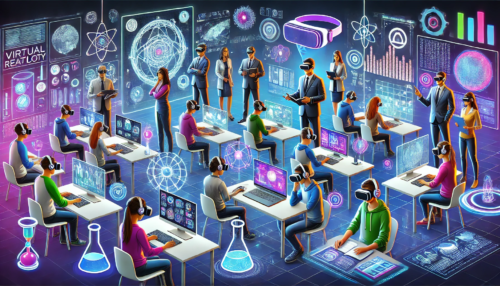Mastering 2025: Skills for the Next Big Leap
AI literacy, critical thinking, and remote collaboration at the forefront
Ever found yourself scrolling through the latest job ads, wondering how the world flipped upside down so quickly? One day, folks were chatting in offices next to the water cooler; the next, everyone’s Zooming from their kitchens and adopting AI-driven solutions faster than you can say “algorithm.” People keep telling us that the 2025 job market demands a brand-new set of superpowers—particularly AI literacy, critical thinking, and remote collaboration. But what does that even look like in real life? Let’s meander through some grand possibilities, awkward detours, half-formed ideas, and purposeful repetitions (because sometimes we need a double-take) to understand what’s truly at stake.
The Not-So-Obvious Push Toward AI Literacy
Ever felt like your phone knows you better than your best friend? As we move into 2025, technology is evolving faster than a hummingbird’s wings in flight. From chatbots that respond to your midnight cravings for pizza to advanced data analytics that monitor global health patterns—artificial intelligence keeps popping up, unannounced, in every corner of our world.
Yet, there’s an emerging confusion that AI is only for coders or some elite group of scientists in hush-hush laboratories. Actually, AI literacy is as relevant for an artist shaping digital paintings as it is for an HR manager scanning thousands of resumes. If you’re stuck in the “Oh, I’m not technical enough” mindset, you might be missing out on the biggest wave to sweep job markets in decades.
Strange as it sounds, local governments across different continents are also keen on funding AI training programs. According to a few governmental proposals discussed in the media last year—some championed by city councils in Australia and others by departments in North America—there’s a growing budget for free or subsidized AI boot camps. Some critics argue these initiatives move too slowly; politicians keep saying, “We’re evaluating the best approach,” and eventually they pass new bills in the Senate or Parliament that attempt to expand these programs. But hey, at least it’s a start. Like my grandmother always told me, “Better late than never, but never late is better.”
Government Notes: A Rapid Shift
In 2025, many countries are pushing for national AI strategies. A few government announcements revolve around:
- New Tax Incentives for companies investing in AI-driven upskilling.
- Education Grants for institutions that specialize in AI training, particularly for underserved communities.
- Collaborative Task Forces that pair government bodies with private labs to accelerate AI-related research.
When asked about these expansions, certain political figures highlight “job preservation” as their biggest rationale. It’s politically palatable to emphasize how AI can create new roles—rather than focusing on the dreaded possibility of automation. Even so, not everyone’s convinced. Still, the momentum is real.
Wobbling Through Critical Thinking in a Noisy World
Critical thinking isn’t new. Ancient philosophers have harped on the importance of introspection and logical reasoning for centuries. Yet, nowadays, with a zillion bits of information swirling around, distinguishing truth from hype is like sifting gold out of a landfill.
The job market of 2025 requires an extra dash of skepticism and clarity. Whether you’re an engineer testing AI modules or a marketing expert analyzing data on consumer trends, you need to question the assumptions behind every graph, statistic, or click-through rate. Remote work can sometimes isolate teams. Without in-person collaboration, folks might rely too heavily on digital dashboards that can be misread or manipulated. A small error in data interpretation can cascade like a broken link across an entire project.
Research labs (at least the ones sprinkled around the globe) continue to highlight the gap in critical thinking skills. One neuroscientist from a reputed international lab (who spoke at a conference last summer—apologies, I’m forgetting the exact link) discussed how the constant barrage of social media might hamper deep thinking. The quest for “likes” can overshadow nuanced thought, making critical thinking a rarer commodity. If you want a competitive advantage, sharpen your ability to see beyond surface-level glitz.
Political News: Infodemic or Reality?
You can’t talk about critical thinking in 2025 without mentioning the political uproars. From election campaigns that rely on micro-targeted ads to grand speeches about “fake news,” we’re living in a charged environment. Some newspapers report that certain political parties are drafting legislation to regulate the spread of misinformation, especially misinformation that robots or AI might inadvertently promote. There’s talk of collaboration between governments, social media platforms, and fact-checking organizations. Will it work? People are skeptical, but we’re along for the ride regardless.
Embracing Remote Collaboration: From Cozy Slippers to Boardroom Deals
One surprising shift in the job market is the unwavering emphasis on remote work. We used to think it was a short-term fix when global crises arose. But now, professionals in everything from content creation to advanced biotech research often do their tasks from a distance. The concept of a “global workforce” is no longer a fancy buzz phrase—it’s everyday reality.
But let’s face it: working remotely can be weird. Sometimes the line between “my personal couch” and “my office desk” is hopelessly blurred. Communication mishaps happen, someone’s Zoom microphone fails, you forgot to unmute yourself while delivering a pitch—the usual comedic chaos. Nonetheless, employers are actively hunting for talents who can collaborate seamlessly across time zones and cultural boundaries. Virtual brainstorming, real-time document sharing, and asynchronous workflows are the new normal.
Government & Corporate Collaboration
Some governments, particularly in tech-forward regions, are championing remote collaboration by encouraging companies to adopt flexible hours, inclusive of local labor regulations. Policies might involve rethinking traditional labor laws that once required physical presence, especially in high-security or specialized roles. It’s a puzzle—balancing secure operations with remote convenience—but it indicates a big wave of innovation in workplace laws.
Celebrity Words and Bold Ideas
In a recent interview, a wildly famous singer (rumor says it was a pop icon well-known for philanthropic endeavors) mentioned how her music tours now leverage remote production teams. She quipped, “We used to chase each other across continents, now we just log in to jam.” Another megastar known for action movies (maybe you can guess who) highlighted the significance of AI literacy in analyzing fan feedback and shaping new scripts. They joked about being replaced by a hyper-realistic AI stunt double—“But until they make an AI that can replicate my comedic timing, I’m safe,” he said. Possibly that’s a bit of Hollywood bravado, but it underscores how big names see these changes unfolding.
From the Elders’ Hearts: Wisdom or Worry?
Bring up AI, and my granduncle usually chimes in: “Back in my day, we had to walk five miles to find a library and memorize half the books!” Now, older generations often carry a mix of awe and concern. Awe at how quickly tasks can be completed, and concern about losing the personal touch or the dignity of face-to-face work. Some seniors protest that fully remote collaboration might deepen loneliness. Others think the advantage is you can keep working even if mobility or health becomes an issue. So there’s a swirl of opinions: “Are we missing out on genuine human connection?” or “Isn’t it wonderful that technology helps seniors stay employed and independent?” Possibly both.
Socially, older individuals sometimes face bias in upskilling programs. Government initiatives do try to include them—at least that’s what official announcements say. But in practice, they might need extra support, particularly with digital tools. The concept of “continuing education” for senior citizens is starting to see more traction. Some advocacy groups argue that bridging generational gaps in AI literacy fosters a more cohesive workforce. Others worry about wasted funds if certain older learners get frustrated and drop out. And so the debate rages.
Youth Perspective: Bold, Hungry, and a Little Overwhelmed
On the flip side, younger folks (hello, Generation Z!) are typically raised alongside technology. They snap photos, record daily vlogs, and do complex research on phones. But ironically, they may still need formal AI literacy training—because TikTok savvy doesn’t automatically translate to AI programming knowledge or advanced data analysis.
Youthful activism is also shaping the political discourse around the job market. Students, fresh graduates, or entrepreneurial teens living in small towns or big cities are now calling for mandatory AI courses in public schools. Some argue that learning about machine learning and data ethics is as crucial as studying algebra. The local government in some municipalities is already rolling out pilot programs that incorporate these subjects into the high school curriculum. “We want a generation that’s not just digitally aware but digitally creative,” said one city council official. It remains to be seen how effectively these programs scale nationwide, but the seeds are planted.
Research Labs and Scientists: Where the Future is Born
When we talk about skills for the 2025 job market, we can’t ignore the brilliant minds in research labs around the world. Institutions focusing on AI, neuroscience, or advanced robotics have a direct line to job market trends. They often foresee changes in demands for coding languages, data management, and software frameworks. Some labs release periodic “Future of Work” briefs. For instance, the World Economic Forum regularly posts new insights (see WEF Reports for more information). Or check out ILO publications on job skills forecasting (ILO Global Publications offers global perspectives).
Top scientists are not only refining AI algorithms but also studying the human behaviors that intersect with these technologies. They see the job market as an ecosystem: humans, machines, data, and regulations all swirl in a never-ending dance. The labs are also forging unusual partnerships with private corporations. We see them working on everything from AI-enabled prosthetics to language translation tools. And ironically, these labs now require staff with strong remote collaboration skills too—imagine a mathematician in Sweden working with a data scientist in Brazil to interpret the same dataset in real time.
Slight Pause and Contradictions
Sometimes we want these skills—AI literacy, critical thinking, remote collaboration—to form a perfect trifecta. But humans are messy. Companies may adopt new tech at breakneck speed yet fail to build a culture of critical thinking. People might champion remote collaboration but yearn for a return to bustling offices. We’re all a bit contradictory, carrying dreams of frictionless progress while missing the tangible warmth of human connection.
For instance, governments champion AI yet worry about mass unemployment. Politicians pass remote-work bills but fret over economic disparities in areas lacking stable internet. Are we pushing for a future that works for everyone, or only the privileged few with reliable Wi-Fi? These are tough questions with no easy answers.
Quick Repetitive Reminder (Yes, On Purpose)
- AI literacy: Not just for coders. Everyone from accountants to poets can benefit.
- Critical thinking: The best shield against illusions, data manipulations, and misinformation.
- Remote collaboration: Geographical boundaries are fading; your teammate could be on a different continent.
Repetitive? Sure. But these are big ideas, and sometimes hearing them twice helps them stick.
Navigating Social Aspects and Emotional Realities
On a broader scale, these new job skills also intersect with social structures. Widespread remote work can impact real estate markets, public transport usage, and the overall hustle-bustle of city life. Maybe smaller towns will get revitalized as employees realize they can be based anywhere. Meanwhile, older people share personal stories of adapting to strange new devices and ways of working. Younger generations buzz around innovation hubs, occasionally stumbling but forging new paths.
In online communities, you’ll find plenty of personal anecdotes about juggling these demands. People talk about the mental toll of staying on top of never-ending updates—software updates, skill updates, professional updates. It can be exhausting. Sometimes, ironically, the best skill is knowing when to unplug and think.
Rattling Political Tidbits: Policies and Tensions
Politically, the push for these future-ready skills sets off intense debates. Some leaders brag about funneling billions into AI research or remote work expansions. Others see a hidden agenda—maybe an attempt to mass-collect personal data or undercut labor rights. The swirl of news coverage can feel overwhelming. Local constituents might protest if they see funds diverted from public services to finance AI projects for private corporations. Some folks wave signs saying “We want real jobs, not bots,” while others argue that AI creates more interesting jobs. The tension lives in multiple truths.
A Jolt of Optimism from Celebrities and Thought Leaders
It’s not all gloom. A celebrated entrepreneur might donate heavily to philanthropic efforts in digital literacy. Some celebrities, from sports icons to best-selling authors, sponsor scholarships aimed at bridging the tech divide. They say stuff like, “We want to empower the next generation to lead with code and conscience.” Sure, it might come off as publicity, but every wave starts with a ripple.
On social media, you might see cameo appearances from actors urging youths: “Stay curious, you never know what breakthroughs you’ll be part of.” The underlying theme? The 2025 job market might be complex, but it’s brimming with potential if you have the right skill set.
Where Are We Headed?
We can’t say for sure that AI literacy, critical thinking, and remote collaboration are the only skills that matter. Let’s face it—soft skills like empathy, negotiation, and humor might become even more valuable to balance out the mechanical precision of AI. People who harness these three biggies (AI, thinking, collaborating) will likely stand out from the crowd in job interviews or entrepreneurial ventures.
Yet, the real question is how you can adapt these skills for your personal journey. Maybe you’re taking an online course on machine learning for the first time or sharpening your debate skills in a local policy club. Maybe you’re trying new remote platforms with your cross-continental startup team. The path is personal. The demands are universal.
Want More? Step This Way!
External Resources
- World Economic Forum Reports – Detailed publications on future job trends and needed skills
- ILO Global Publications – International Labour Organization’s extensive research on employment shifts
- US Department of Education – Initiatives and grants for digital and AI literacy programs
Your FAQs, Answered
Q1: Do all industries need AI literacy now?
While not every profession demands hands-on coding, nearly all fields can benefit from basic AI awareness—healthcare, finance, design, or even non-profit management. AI literacy ensures you can leverage new tools effectively or at least converse with those who develop them.
Q2: What if I hate remote work?
Remote work isn’t mandatory for all roles, but it’s increasingly common. If you’re a social butterfly craving face-to-face contact, hybrid models might be your sweet spot. Meanwhile, some companies do champion purely in-office environments. Ultimately, the choice depends on your comfort zone, job responsibilities, and the company’s culture.
Q3: Are governments really supporting upskilling?
Yes and no. Many governments talk about boosting digital and AI literacy, and some actually provide grants or incentives. However, the pace of implementation varies. Check your local government website or Department of Labor pages for specifics.
Q4: Why is critical thinking linked to AI?
AI can process huge volumes of data but still relies on human guidance to set objectives and interpret outcomes. Without critical thinking, you risk blindly trusting flawed AI outputs. It’s about balancing data-driven insights with common sense and ethical considerations.
Q5: Is remote collaboration here to stay?
It’s a strong possibility. Even as some offices reopen, the convenience and cost-effectiveness of remote setups have proven their value. Also, cross-border collaborations can bring fresh perspectives.
A Final Nudge (Because We All Need Encouragement)
So, are you psyched, perplexed, or mildly anxious? The 2025 job market is a swirl of possibilities that can spark new dreams or keep you awake at night. Government policies, political debates, research labs, starry-eyed celebrities, wise elders, and ambitious youth—each contributes a voice in this evolving symphony.
Before you dash off, consider a baby step: maybe sign up for that free AI workshop your local community center is hosting, or join an online group discussion about remote team-building. No single journey is identical. The world might feel as though it’s spinning faster than ever, but you’ve got the potential to steer your own course.
Oh, and remember, a random glitch or two along the way? That’s life. We adapt, we learn, we keep going. Because in the quest for the next big leap, every little hop counts.




